colleen hoover: a deep dive
postcard 39: on colleen hoover, her bibliography, romance books, and i truly mean this when i say, nobody is more qualified and justified to do this than me (ft. my friends throughout the years)
This post is too long for email—please view on your desktop or app <3 Also, this was supposed to be a paid post but decided that I liked it too much (and was too important) to make it one. If you enjoy this post, please consider upgrading to a paid subscription to support me!
Disclaimer: I do not like Colleen Hoover. I do not have one single positive thing to say about her. And I will not be pretending to like her or be impartial or say “oh she has some good moments!” (because she doesn’t) in this post, so please do not read if this bothers you. I already have so much to say without doing so; I don’t need to be entertaining and writing down ‘on the other hand’ statements that I don’t believe in. If you also do not like her—welcome home, because this ended up being an average length academic dissertation. Spoilers ahead as well, but read this anyway to save yourself from reading her books.

Anyone who was deep in the throes of Wattpad back in 2014 like me, knows about Colleen Hoover. Not the Colleen Hoover who outsold the Bible in 2022, but the one who published Finding Cinderella for free on Wattpad before signing a contract with Atria Books to traditionally publish both her subsequent and backlogged books. In a way, despite what I think of her books, I do have to hand it to her; she is most likely the most inspiring case of self-published-to-international-success author the world has ever seen (I mean, she outsold the Bible). There was a time when every self published author would publish previews or their entire books on Wattpad, and she was no different.
When I was thirteen, I would read and write on Wattpad at 5am with my phone flashlight under my covers. The fact that I was a Wattpad Star (this is a real thing, not just something I call myself) with millions of reads in my teenage years is probably my worst kept secret, and I was addicted writing to cliché, soapy, angsty romantic lines that could only spawn from a sixteen year old’s mind (although writing about Wattpad on my personal statement for college actually ended up working really well, because I’m sure absolutely no one else was writing about it). I took all of my novels down and left Wattpad because they’re a horrible platform, but I still get messages in my Instagram inbox very often, asking me to put my works back up.
I spent a good majority of my time when I was 13-15 reading these books as well, inhaling them like they were some of the best pieces of award winning literature the world had ever seen. Colleen Hoover’s books fit right into this mold, her books and plots barely discernible among ones written by all the young fourteen year olds who dreamt of having a billionaire fall in love with them. Her books fit like puzzle pieces on the trending list on the orange site, right above The Bad Boy, Cupid, and Me, and right below Mr. Popular and I, when every single book seemed to fancast Francisco Lachowski as their main character. And I truly mean it when I say that both of the aforementioned were written a thousand times better than her books.

in defense of romance…
I am not here to judge or crucify anyone for reading romance or cliché books; I think there is true magic in reading a good romance. I don’t read romance books often, but I do love romance books. While this may seem like a paradoxical statement, it’s not. Book Lovers by Emily Henry is one of my favorite books (perhaps selfishly, because I thought Emily Henry was taking pages straight out of my journal when writing Nora’s character). While my voracious need for a good wish fulfillment romance has waned off to reading one or two a year in my twenties, the point still stands that finding a well-written romance is like finding an oasis in the desert.

I love romance, but I love books with nuanced, three-dimensional characters even more. There is nothing like reading about a couple you are rooting for finally get together, or the protagonist realizing that they are actually, in love with the person they last thought they would be. But I feel like the true appreciation only comes when I can imagine these characters as fully realized characters. So many romance books feel like watching a play, where you know for a fact that after it ends, the characters are going to become actors who simply go home for the night. Not two real people who live happily ever after beyond the pages of the book. I don’t like it when everything in the book is executed to propagate the idea that the two main protagonists belong together.

The reason why I love romance books is because I am a cynic. Because while real life is often disappointing, romance serves as escapism. In romance books, love is beautiful and pretty and wonderful. I feel less lonely and maybe even sometimes optimistic. Good romances are introspective and thought-provoking and I sometimes learn more about myself than I would in other genres. When I see qualities of myself in protagonists and see two characters I root for get together, it feels magical.
None of this applies for Colleen Hoover’s books.
the bizarre and dangerous colleen • hoover • verse
(featuring copious amounts of text messages about Colleen Hoover from my best friends through the years to break up the very large body of text)
In Colleen Hoover’s books, women are doormats, men are possessive and borderline abusive, and romance is something that can only be born of a concoction of insane circumstances. Hoover puppeteers her characters into crazy ‘fates’ written in the stars of her shallow skies of illusory true love. Everything that brings the two of them are full of baffling coincidences, and they are bound by the red string of love at first sight. She uses these plot lines to force some watered down version of romantic chemistry to alchemize out of this, as if all love needs is a man telling a woman, “I’d never hit you!”, fifty five thousand times throughout a book.
Not to mention that most of her characters do not have remotely normal names. It’s very reminiscent of celebrity baby names in the worst way—Jamie Oliver’s or Nick Cannon’s children names come to mind—like Colleen Hoover is actively trying to drill home the point that these people do not truly exist, and cannot, on a realistic plane. Ryle Kincaid, Lily Blossom Bloom (her worst offense following Emerson Dory Kincaid), Merit, Crews, Chastin, Diem, Leeds, are just some of the names that scatter across her pages.
In general, the names are the least of my worries or not my bone to pick for this post. Unique names exist everywhere, and while I do think that naming your daughter after the fish in Finding Nemo is incredibly bizarre, to each their own. Her issue lies in how she romanticizes issues and personalities that are raging red flags. A few months ago, I posted Colleen Hoover’s worst lines as a thread on Twitter, and it went very viral. These lines are truly just the tip of the iceberg—out of context, they seem bad. In context, they’re gravely atrocious.
One of my biggest issues with her is the way she writes her main male characters. Like I mentioned above, they are all possessive and oftentimes borderline abusive. This is all dismissed with careless disregard for the idea that they are charming and hot (and dark and mysterious, obviously). They do terrible, toxic things, which are unequivocally and unconditionally excused by the female characters because love does conquer all, right? Whether that’s telling a burn victim that it’s their fault, or telling his wife struggling with infertility that “making love to her is like making love with a corpse”, or asking if they can have sex with the protagonist right after she finds out that she was a victim of child sexual abuse, Colleen Hoover proves time and again that not only has she never written a healthy relationship, but she apparently does not know what one consists of, because she fails continuously. Once is a mistake, but repeated offenses throughout her entire author career makes me think that she just thinks all of the above are romantic.

I know that it’s not romantic. You also (hopefully) know that it is not romantic. However, with the proliferation of book based social media, Booktok in particular, her books have exponentially skyrocketed in popularity. It is impossible to go into any bookstore without seeing her books propped up on a display stand. Her books are everywhere, clutched in people’s hands on public transportation, on celebrities’ Instagram stories, at every Hudson News at the airport. Colleen Hoover has become literature’s version of the ghost-child standing in the corner in Insidious, unwanted but haunting you in every single bookstore.
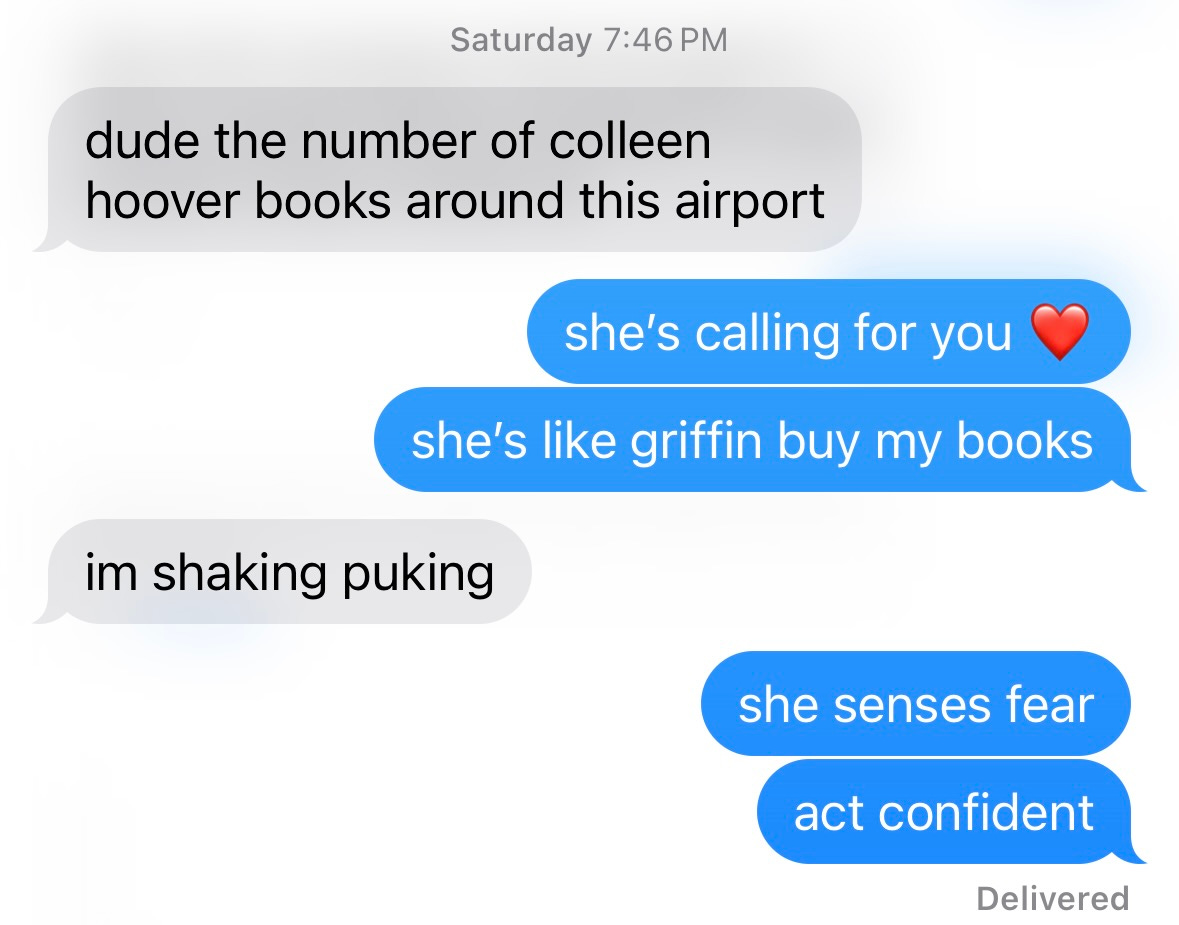
It’s understandable, in a way. People who are new to reading are introduced to her books by mass exposure, and they have an incredibly easy readability that requires no critical thinking at all. There’s no reading between the lines, or need to analyze. Everything is told, and every dialogue is straightforward. The plots are soapy and dramatic and give you the same attention draining dopamine rush as scrolling for a few hours on Tiktok. There’s nothing wrong with that; there’s literature that demands scrutiny and introspection and examination, but there’s also easy reads that you can fly through. And many times, this serves as an introduction to reading more complex pieces of writing as well.
Is Colleen Hoover’s writing the pinnacle of good literature? Absolutely not. If someone agrees, they are either lying or have never read another book. But it would be fine if she wrote in the same way she did, without the terrible plots and the toxic relationships she advocates and promotes as love. Booktok primarily reaches audiences that are usually minors (a few years ago, my little sister, who was then twelve, came and asked me if Colleen Hoover was worth reading. Everyone in my class is reading it, she told me. Over my dead body, I answered), who are impressionable and don’t know right from wrong in a relationship. I think there’s a tangential discussion to have about how preteens and young teenagers these days do not have the breadth of young adult novels (having grown up during the YA Golden Age from 2013-2017, it’s so upsetting seeing what my sister’s age group has for them these days); they have extremely easy access to social media and there is no real defined “YA section” anymore—if Colleen Hoover books are what big book accounts recommend for them to read, using adjectives like heartbreaking and tearjerker and lifechanging, they’re inevitably going to pick it up.
This definitely brings forth another discourse that is worth having, about authorial accountability and how much the blame falls on the author when they write in such a manner. Should authors have a responsibility to those who read their books? Fundamentally, as a standalone question, I don’t think so. At the end of the day, by reading fiction, we are voluntarily indulging in the imagination of a different person. I think this concept is complex in itself, as art demands to be consumed and criticized and discussed. And while that is entirely within the right of the consumer, it usually does not mean the responsibility and accountability should fall on the author without question.
However, there is much to say about the marketing that goes on behind promoting a book. It Ends With Us, particularly, which is should not be marketed as a romance (or as Blake Lively said, a movie where you should “grab your girlfriends and wear your florals!” which I’m assuming was a poor attempt in trying to have her own viral movie moment and recreate the phenomenon of wearing pink to see Barbie in the theaters last year). One of those is a good movie, and it’s not the one with Lily Blossom Bloom and her flower shop. With marketing anything, it is incredibly important to fit the tone and vibe of the product you are trying to sell. By selling a coloring book and a nail polish line for a book that is about domestic abuse, Hoover is essentially implying that the heavy themes in her book are lighthearted and should be treated as such.
Whenever I criticize It Ends With Us for being marketed absolutely horrendously, fans are quick to jump in and say that it’s ‘not a romance’, it’s women’s fiction about breaking the cycle of abuse. While I will talk about individual books later down the post, it’s important to just talk about this briefly here. I understand that It Ends With Us opens up room for a lot of important discussions surrounding domestic abuse, it is not a plot that handles it well. I do strongly believe that it’s in part because Hoover herself does not know that what she wrote was problematic. But Ryle’s behavior is controlling and manipulative to begin with. He does not begin to become abusive after he hits Lily. Abuse does not have to be physical: it envelops everything from emotional manipulation to gaslighting. And Ryle does all of that, which Hoover (again) packages as ‘romantic’. This is what I mean by the fact that it is marketed as a romance—the initial swoon worthy whirlwind romance that Ryle and Lily have, which Hoover verbatim says in her acknowledgements that she also believed was ‘romantic’, is not at all. That’s not her laying down subtle red flags so people can read between the lines. That’s just how she writes her romances.
This post is mainly to criticize her books, but it would not be fair to do so without mentioning the biggest controversy she was involved in: that when a 16 year old girl came forward and DMed Hoover on Instagram that her 20 year old son sexually assaulted her, she simply blocked the girl. While Hoover herself has given mixed statements—first, denying it completely, then second, trying to make amends with the girl, which tells you all that you need to know about the situation and Hoover’s character in general—this sort of behavior does fit exactly into the type of books she writes. It is truly an if the shoe fits moment.
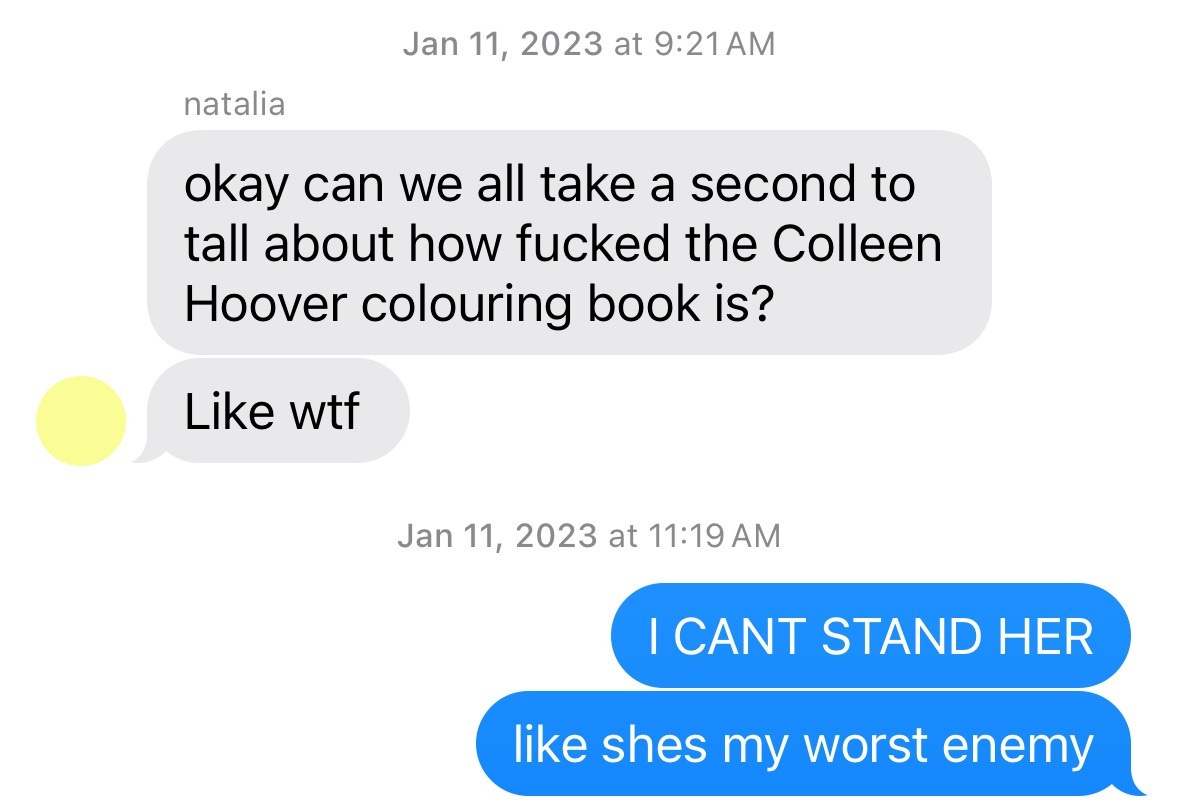
Tangentially, and perhaps in a bizarre way, her books remind me of how I felt reading A Little Life, which is a book I have a lot of strong negative emotions about (Andrea Long Chu’s The Hanya Yanagihara Principle essay sums up everything I hate about it). As emotive beings, I think we are trained to think that whatever piece of media evokes or elicits emotion in us means that it is good. Feeling strongly, such as a book or movie making you cry, will cause you to think about it for the next few days, which we think of as the actual media being good. I initially five starred it, and then removed the rating altogether as things I learned about Hanya Yanagihara made it impossible for me to separate the artist from the art, which I explain in my review. I initially thought A Little Life was a good book because it made me so drained and sad for the next few days after I read it. But it seemed like it was engineered and orchestrated to evoke those exact emotions. If a book’s main motivation is to do that, does that still make it good? I’m leaning towards no.
Colleen Hoover seems to follow the exact same formula. In her books, her characters have painful and tragic backstories or personal lives—a survivor of a house fire, a woman right out of prison, a couple struggling with infertility, a man who lost his newborn child in a car accident. Some of these situations are so agonizing that our immediate reaction is to empathize with the two dimensional characters with no more than three personality traits, generously speaking. In the same vein in which Benton James Kessler’s (real name from the book) novel from November 9 is a hypothetically ‘critically acclaimed’ one, Colleen Hoover’s books feel like they exist in an alternate universe, like our world just got slightly knocked off its axis, and everyone suddenly has ridiculous names, arson is sexy, and women should always take back men, no matter what they do. And the worst thing is, many people in this universe are saying that this is completely normal and ‘realistic’.
One of the strangest arguments I hear in defense of her books, and her male characters in particular, is that they’re great because they’re realistic. While I have no idea what is so realistic about a guy trying to make it as a writer while writing like the image above, I do get that many people equate being terrible to being realistic. However, if any of my friends were in relationships with guys that felt like a Colleen Hoover character, I would beg them to break up. Being ‘realistic’ is not necessarily a convincing argument, because not only is ‘realistic’ subjective, it is not a good enough argument to condone said things. This is why I sometimes wonder if her books should even be classified as a romance to begin with.

Whenever I post a negative review about a Colleen Hoover book on my Goodreads, the comments are always the same, borderline copy and paste. “You don’t get the hardships of life!” or “you don’t understand the nuances of her book!” or “you’re making fun of abuse!” They then proceed to write me a very long essay about why her books are spectacular and why I am wrong for disliking them. I do have to respect it to some degree, because feeling passionate about a book you love is a familiar feeling for me as well. But these arguments begin to feel laughable when you’re putting them in the context of what they’re defending. By criticizing the way Hoover writes about abuse (under a very, very rose colored, damsel-in-distress light that I would say is actually harmful to portraying abuse and domestic violence), I am not ‘making fun of abuse’—sometimes I wonder if people actually believe I’m doing so, or if people are just angry that I talked badly about their favorite book and then became the top review on Goodreads.
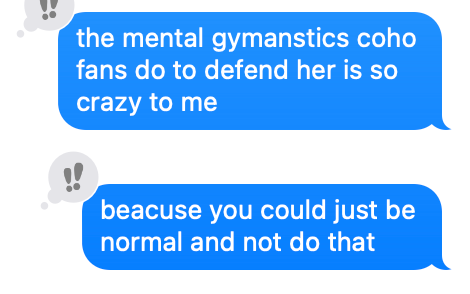
literature review
Spoilers ahead for the next section (and trigger warnings for abuse, rape, and bad writing), but read anyway because do you really want to read her books? I’m going to briefly outline the plot so you understand how…crazy her books are, and post portions of my reviews from Goodreads (I wrote most of these in 2017-2020). You have no idea how much I wish I didn’t remember these plots so I can fill that space in my brain with something more important instead, but we can’t have everything.
A few of my reviews of her books have gone viral, especially It Starts With Us—the sequel to her viral book It Ends With Us. I was bedridden with a particularly bad bout of COVID, and Niña suggested that we read it together so we could see how bad it was. It was pretty bad, and reading it while having a 103 degrees fever made everything in it feel like a fever dream, which is the mental state in which I wrote my review that is (unfortunately) the top review for that book. This has caused many of Hoover’s die hard fans to send me multiple death threats and ill wishes. I truly wish Colleen Hoover’s books were not the hill for anyone to die on, but to each their own.
NOVEMBER 9
Fallon meets Ben one fateful November 9 at a coffeeshop. She is with her father at this time. She is an aspiring actress, and her father continuously crushes any sense of hope she has for making it. Ben pretends to be her boyfriend to get her dad to go away, and they instantly fall in love. The book abruptly alternates to Ben’s perspective, and immediately, we are thrust into the mind of Ben, who is, to put short, rape-y and controlling and incredibly voyeuristic. He sees her burn scars and begins wondering: “And of course, this thought leads me to her breasts again. Are they scarred, too? How much of her body is actually affected? I begin to mentally undress her, and not in a sexual way. I’m just curious. Really curious, because I can’t stop staring at her, and that’s not like me.” I particularly love the fact that he said “that’s not like me” about being unable to stare at her, and not mentally undressing her, and not in a sexual way, because that makes everything okay.
Fallon is leaving for New York in a day, so they decide to meet every November 9. This specific plot is boring, as they just have a will-they-won’t-they angst filled romantic arc that I could care less about (although I do have to mention that Ben’s brother dies, and he starts dating his dead brother’s widowed wife). Ben stays true to himself, saying that he wants to physically hold down Fallon so she can’t leave, or later on when they’re kissing in some storage closet and Fallon says “stop” and he says, “I’m trying. Ask me again”. In the end, Ben realizes that Fallon is a victim of a house he set on fire (arson!) because his mother’s boyfriend (Fallon’s dad) broke up with her, and she committed suicide. Fallon thinks this is fate, they end up happily ever after.
Some memorable quotes:
UGLY LOVE
Miles, a pilot, and Tate, doormat extraordinaire a nurse, meet through her brother, and they begin hooking up. Miles tells her that it can’t be anything more than a no-strings-attached relationship, although Tate is falling in love and losing her mind over him by day 2. He leads her on for the majority of the book although it is clear that Tate has feelings for him. The book is told through alternating chapters, Tate’s POV (present) and Miles’ POV (his backstory, which is told in some of the worst poetry I’ve ever seen in my life).
Through Miles’ chapters, it is revealed that in high school, Miles fell for his stepsister, Rachel, and they began a relationship. Soon after, she became pregnant and they had a baby, but while driving home from the hospital, their car fell off a bridge into the lake. The car accident unfortunately killed their baby, and Miles believes that he is unable to love again because of that. But that’s not before Tate lets herself get hurt again and again (including him saying Rachel’s name while they are having sex, and her saying the famous words: just finish, Miles). In the end, Miles realizes his undying love for Tate, he makes amends with Rachel, and they live happily ever after.
Some memorable quotes:
If any other man ever treated me like he did, it would be the one and only time. I don’t put up with the things I’ve seen a lot of my friends put up with. However, I find myself continuing to make excuses for him, like something could actually justify his actions last week.
HOPELESS
Seventeen year old Sky lives a normal life with her mother, who is a single parent. She one day bumps into Dean Holder at the parking lot of a grocery store. Holder suddenly grabs her and says, “do I know you?” and Sky says, “no, this is the first time I’m ever seeing you!” Holder, instead of walking away like a sane human being, demands to see Sky’s government ID. And Sky, obviously, like a sane human being, hands it to him. He says “never mind!” but they start seeing each other. Holder is easily aggravated (getting upset for seeing Sky talking to another guy in school), but then he always sneaks in at night through Sky’s bedroom window to apologize to her. So romantic.
They begin dating, naturally. One day, Holder finds a bracelet in Sky’s drawer, and confronts her angrily. The bracelet is an exact match with the one his twin sister, Lesslie had, who committed suicide a few years back. He accuses her, and then angrily leaves. Of course, sneaks into her room at night and apologizes. He then says the best confession in literature: “I live you. Less than love, more than like, so I live you.” (or something along these lines; I don’t have a screenshot of this and I really don’t hate myself enough to flip through her books to check).

Later on, when Sky finds an identical bracelet in Lesslie’s old room that she also has, she confronts Holder. There, she learns that her real name is not Sky, but Hope, and she and the twins used to be neighbors back in Austin TX when they were younger. For the sake of the plot, we are also going to completely ignore the fact that it is quite literally impossible to end up in the same town twice by coincidence (or maybe this is the fate part). She goes back to her childhood home with Holder, and realizes that she was actually a victim of child sexual abuse at the hands of her father, whose excuse was, “I just had some pent up anger”. He then confesses that he also abused Holder’s twin sister, and then picks up his gun (he’s a cop) and then shoots himself in the head in front of them. They go back to a hotel, and then Holder asks if he can sleep with her…not even two hours after all of this happened. Sky says yes, they have sex, and then all of this trauma magically goes away and they live happily ever after.
IT ENDS WITH US
This is probably going to be the most controversial opinion because so many people pretend this is God’s gift on Earth. It is not. Lily Blossom Bloom meets Ryle Kincaid (the names are real; a tragedy for all of us reading), the neurosurgeon main guy on a rooftop where he is laying out his anger on a chair. She thinks oh wow you are sooo so hot and he’s like “can I fuck you?” and then she’s like “you’re hot, but no, what the hell”, but then he takes a picture of her on his phone which is not creepy at all. And then they go their separate ways.
Fast forward a few months. Lily Blossom Bloom owns a flower shop, because what else would she own. Ryle’s sister coincidentally applies for a job there because she is a millionaire and has nothing better to do and apparently there is only one business in the entirety of Boston to be such a coincidence. She sees Ryle at a party and realizes that the party is at his house. And he has…get this…a blown up, framed picture of her he took that night. He then proceeds to go to her apartment which he only knows of by building. Then knocks on twenty nine doors and gets on his knees and begs her to sleep with him. She does. They begin dating. Eventually they move in together. He burns his surgeon hand and she laughs and he pushes her down the stairs. He apologizes. She takes him back. They get married.
He hits her again then tries to rape her. It happens once again so she leaves him. Then she finds out that she is pregnant so she goes to her old boyfriend Atlas and he takes her in. She divorces Ryle and says “we broke the cycle” to her daughter, but still gives custody to her abusive ex husband who admitted he gets blackout episodes of anger and can’t even remember them. Also, important to note: Colleen Hoover also explicitly says in the acknowledgements that the scenes of Ryle trying to date/sleep with her is supposed to be “charming” and “swoonworthy” so make of that what you will.
IT STARTS WITH US
As a bonus, here is my full review of It Starts With Us, which became the top review of the entire book and still gets me on average 1-2 death threats from Colleen Hoover fans every month.
welcome to: “did this book really need to exist?” part 4343225.
alternatively titled: a bland man does the bare minimum and people eat it up like he’s an austen character.• i don’t get why this book had to exist. it just feels like she is monetizing off the weird success it ends with us got on booktok, and it definitely reads like a cash grab as well.
• if it ends with us was about lily, why did colleen hoover work so hard to try and make atlas into a sexy hero? the only thing i could give it ends with us merit for was the message of breaking the cycle (even that is up for debate). this did not need a sequel at all.
• atlas talking and defending himself about the age he and lily had sex was really breaking the fourth wall. coho definitely was trying to un-fuck up her mistake by making this a sympathy point.
• lily and atlas didn’t really have a foundation of their relationship (which is ironic because atlas talks about ryle and lily’s relationship this way as well) other than the fact that they both had a bad childhood. lily puts atlas on this pedestal because he was there for her at her most vulnerable.
• my theory still stands: colleen hoover, ironically, cannot write a good romance. i believe every single one of her books has these terrible, wild plot twists to cover up the fact that she cannot. lily and atlas had zero chemistry apart from them talking about how miserable they were when they first met and how they were each other’s saving grace.
• also. i did not buy this book, i borrowed it from a friend, so i don’t have a ground to say this but: she included so many flashbacks and used pages of writing from it ends with us? lower the price girl.
• a sequel, which is an outright romance, being written to a book (marketed as a romance which is so gross) about domestic abuse really throws me off.
• (the letters were basically coho saying “see they are in love! they’re not bland! they do have other things in common other than their trauma!) which is false.
• speaking of plot points manufactured to make lily and atlas seem like they had more in common: the brother thing came out of fucking nowhere.
• lily doesn’t have a decent support system. i know she says that she does, but having your abusive ex husband’s sister as your best friend (and literally only her, as lily mentions in the book), is just not? like yes it’s better than nothing but i really hated the way allysa acted in a bunch of scenes. like is she supposed to be a likable character?
• WHY IS LILY STILL WRITING TO ELLEN??? AT YOUR BIG AGE?
• also. every time tiktok is mentioned in a book, an angel loses its wings. you're telling me lily knows about tiktok and gen z but she doesn't know that ellen is a horrible person? ok
• atlas is literally so bland. like i get it. he’s nice. he makes sure to say that he’d never hit a woman every five sentences. good fucking job atlas. you’ve reached the bare minimum.
• atlas writing lily letters and saying “i love you” in a thousand different ways to offset ryle’s character…balance doesn’t work like that.
• speaking of: stop writing her letters for the love of god i literally don’t know if my heart is cold and dead but we get it atlas, you love her and can’t live without her and she saved you. you don’t have to say it a hundred times!! what a waste of paper!!! give us some new content king!
• naming her daughter emerson dory kincaid is literally the worst thing lily blossom bloom has done.
in conclusion, sometimes you try things and they don’t work out colleen! for me it is ice skating, for you it is writing. and that’s ok!
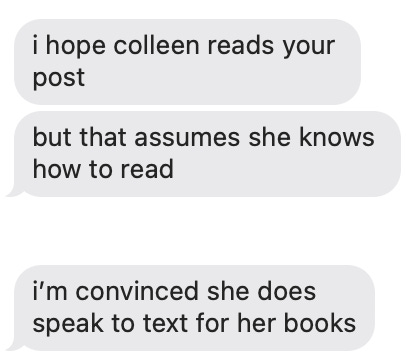






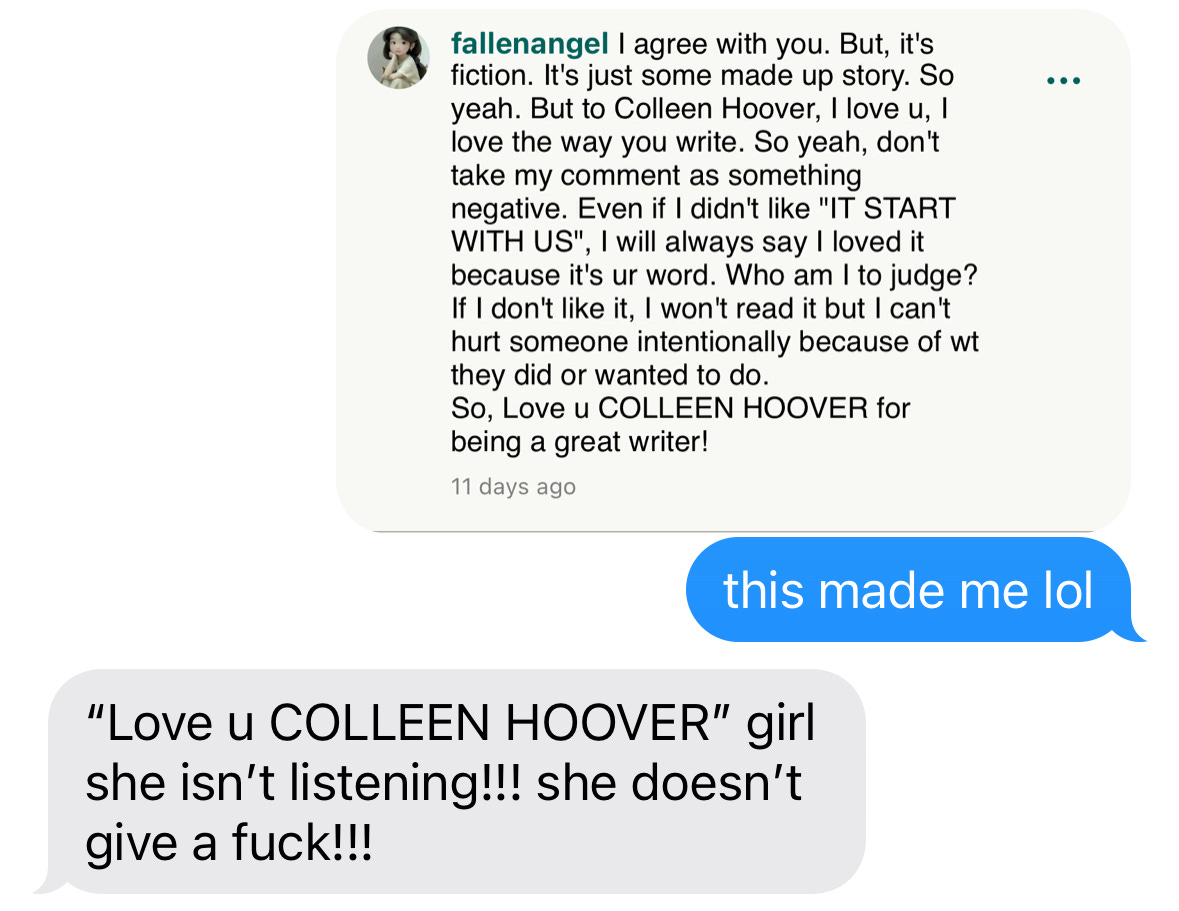

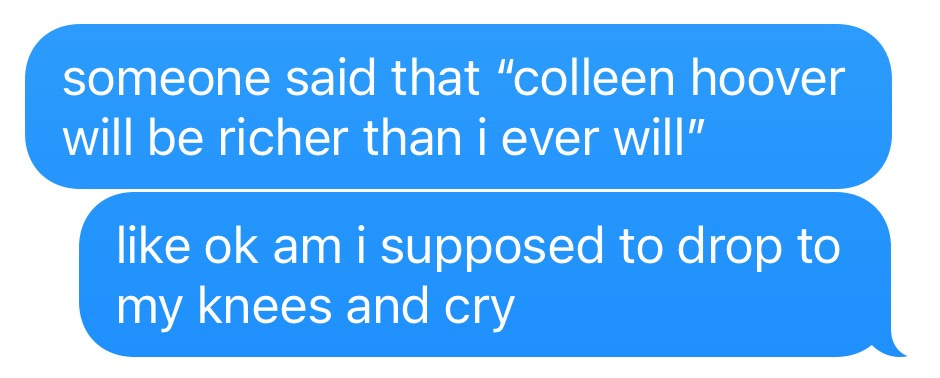
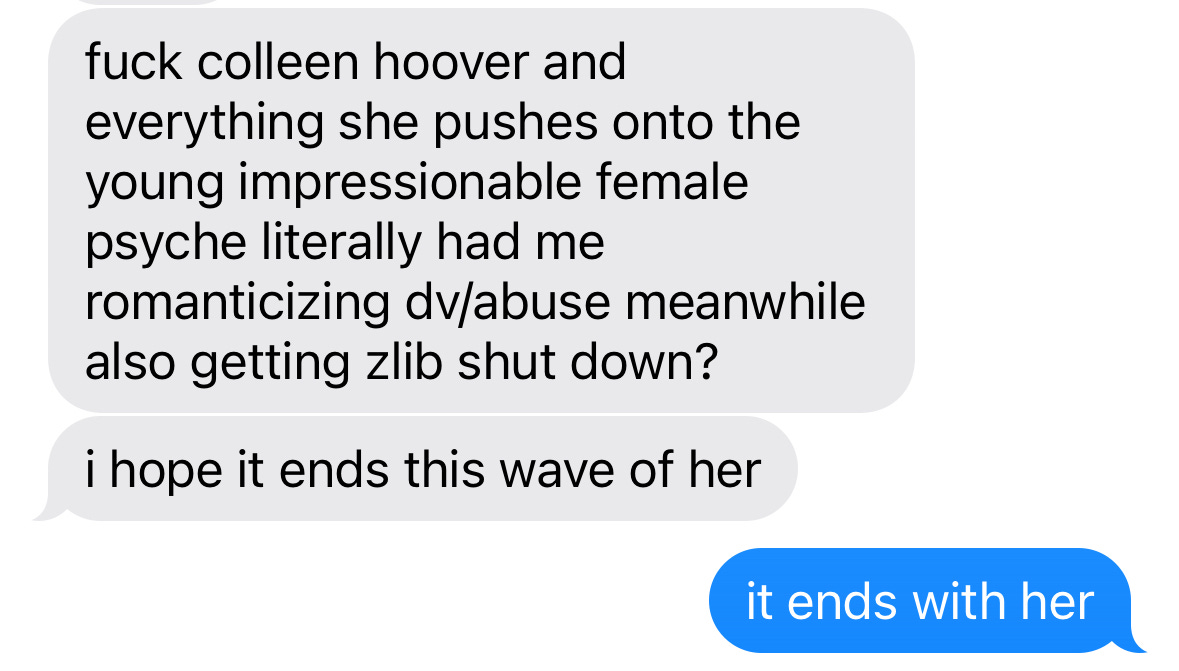




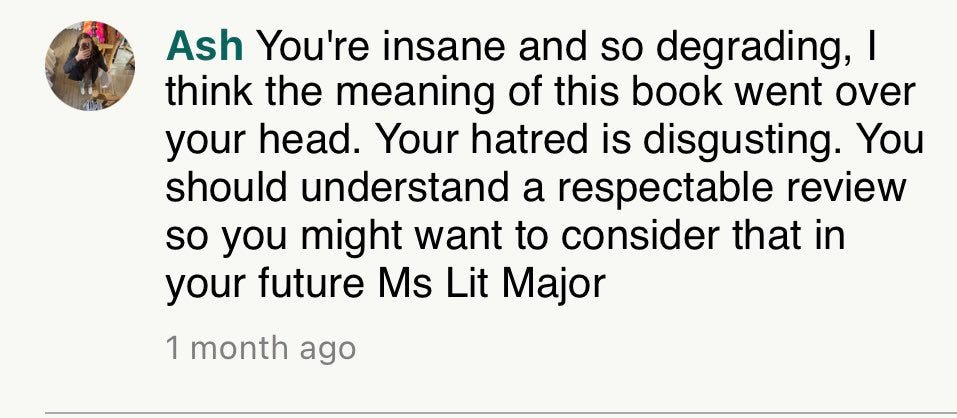

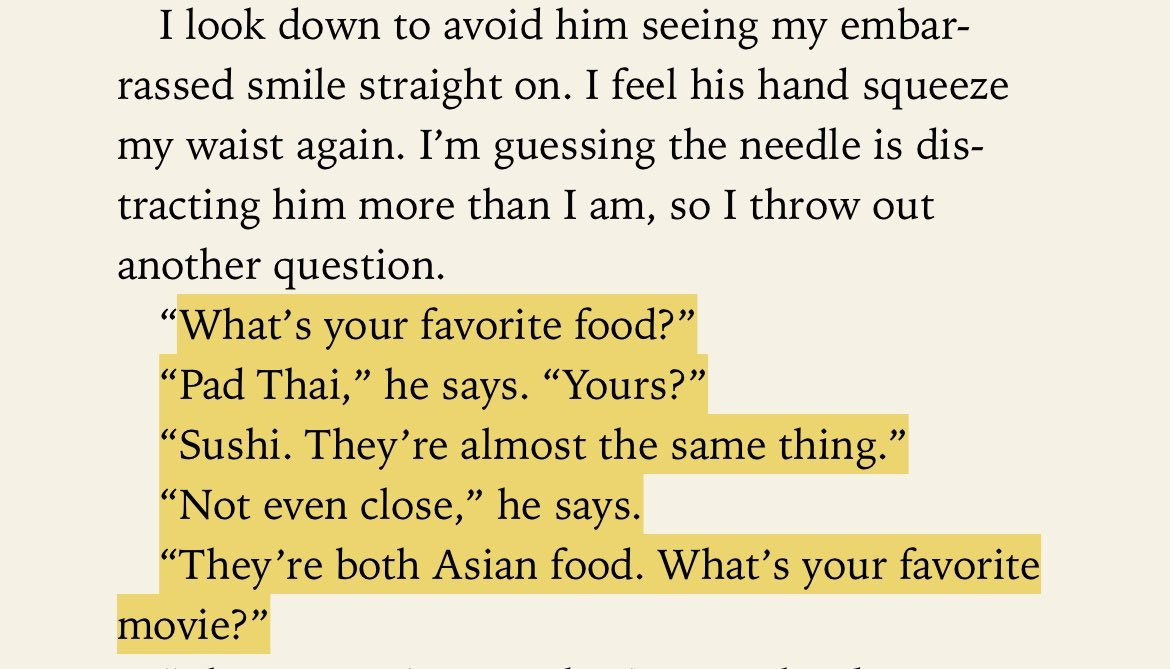



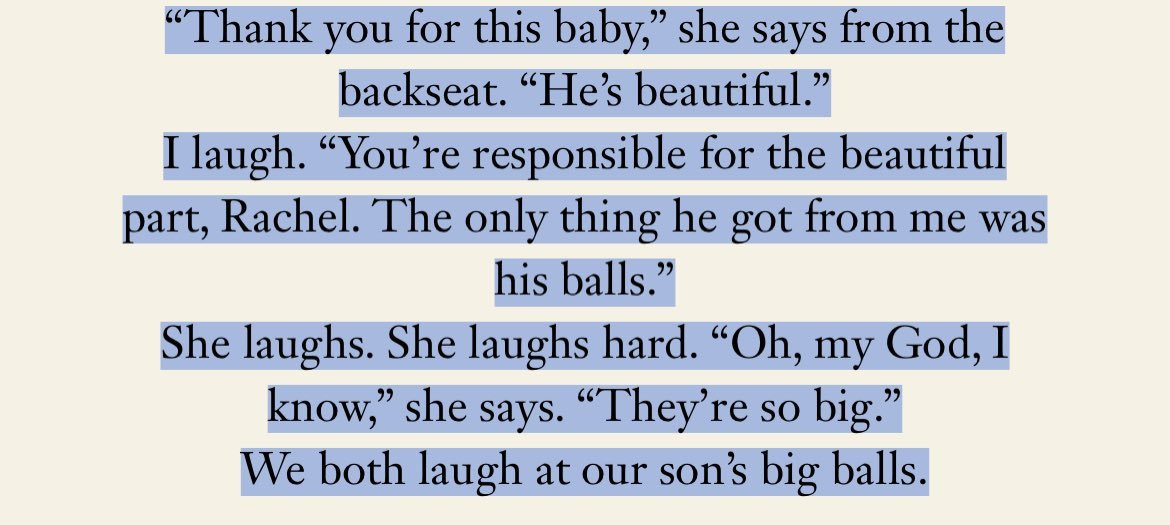




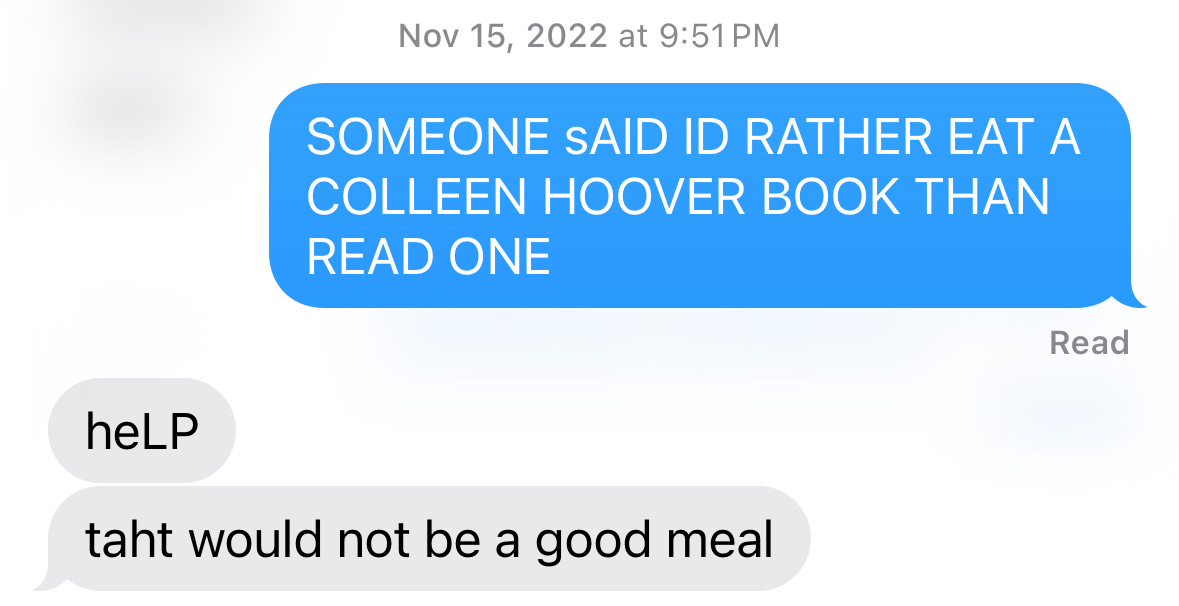

Genuinely - this is the essay I have been WAITING for someone to write. I read It Ends With Us after ALL of my students were reading it (I’m an English teacher) and goodness it was baffling to me that any respectable editor ever gave it the green light. At best, it’s some of the worst writing I’ve ever come across - and again, as an English teacher, I’ve read my fair share of appalling writing. At worst, it romanticises abusive dynamics, and honestly I think it’s quite dangerous that she is so very popular - particularly amongst young women and girls. What a spot on essay - I’ll be sharing it far and wide amongst all of those who try to convince me that her books are worth a second’s thought! <3
coho is the drake to your kendrick and that is so fucking iconic lmao